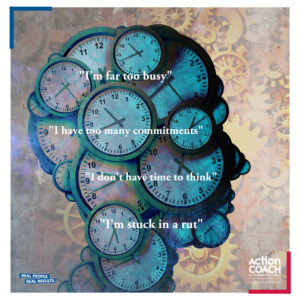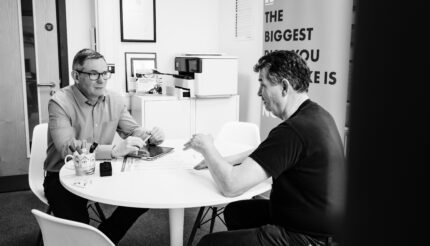What I do when I have so many commitments, I don’t have time to think!
By Rupert Turton
How often do you find yourself saying “I have so many commitments I don’t have time to think?
I can honestly say, I am sometimes guilty of this. It’s during these times I become reactive and not proactive which is not good! So how do I climb out of that pit when it happens?
Years ago, I realised I worked better, that is I was more effective when I took breaks during the day. This of course is counterintuitive to most work cultures! This realisation didn’t just happen. Here is my story of how I learned to ensure I do have time to think.
‘A short history of time (management)’
Those that know me, know I like a plan. I strive to always plan my day. I have done since I did a ‘Time Manager Course’ 30 years ago with a great instructor who managed to make the point in a way that stuck!
Also, at the time, the Time Manager system was contained in an A5 folder that looked great, I was like a kid with a new toy! Now I had my Time Manager folder I had better use it, so I got myself in the habit of planning my day and helpfully, as the system was paper-based, there were only so many to-do’s I could get on a page which forced me to prioritise my work.
Role on a few years and the Palm Pilot arrived! Anyone below the age of 40 will struggle to believe there was a time when I had to carry a phone (which was the size of a brick), an organiser, and an MP3 player – and still couldn’t watch a film or tv on the train!
The Palm Pilot contained all the key planning information that was used in my Time Manager folder but in a smaller device. It had a calendar, to-do list, and contacts. It also synchronised with MS Outlook when connected through a cable, making everything easily accessible on my computer.
Two important points you need to know about the Palm Pilot;
1. It allowed you to set a start date for to-do’s and had a very small screen, which had the impact of making me manage my to-do list so it would all fit on a single page, which was a good practice to get into.
2. I realised it was easier to edit to-do’s and my diary through Outlook on the computer than on the Palm Pilot!
Nearly 30 years later I am still planning my time in more or less the same way.
- I plan in the big activities, those that must happen, as events in my diary.
- If my to-do list is more than a page I know I won’t be able to do it all in a day, so I schedule some activities for a later date.
- I categorise to-do’s into projects so I do not keep jumping from project to project, subject to subject during the day and so can focus on one area and work more efficiently before moving on to another area.
- I prioritise my to-do list so if my day gets badly disrupted, I can focus on high-priority tasks first, before circling back for lower-priority tasks if time allows.
The Epiphany
I was having a bad morning and was stuck – I can’t remember what! I also hadn’t been cycling for 4 days and wanted to get a short ride in at lunchtime. I couldn’t go out because I had a work problem to resolve which in turn was making me stressed and frustrated and ultimately far less effective! In the end, I had a “too hell with it” moment and 5 minutes later was out on my bike! And halfway through that 50-minute ride, I solved the problem. I hadn’t been thinking about it in any structured way but when I got back to my desk everything was sorted in 20 minutes!
Over the following weeks and months, I started to realise that my best thinking happened when I wasn’t actually working. When my mind could just tick over with no objective when my body was doing something and my brain was just along for the ride; walking, cycling, or gardening. After a while when I was stuck, I would go for a walk or cycle and that usually got me started again!
Then I had another epiphany…….
We got a dog on the condition that we would share the care of him between Angela, me, and the kids. So, within a few weeks, we had refined the routine to I walked him every morning and evening and some lunchtimes if I was at home (as the kids were soooo busy they couldn’t possibly spare the time!!!!)
So there were actually two epiphanies.
- I love having a dog and should have got one years before!
- The morning walk was when I planned my day, and the evening walk was when I reviewed the day! The advent of the Smart Watch made this even better as I could dictate notes to my watch while I was walking!
I had developed, over a pretty long time, what is largely considered best practice for optimal time efficiency!
My system may not work for you, but give these tips a go…
Realistically this system of doing things works for me, it probably won’t work for you! Everyone needs to find their own way of working. The key points to take away are;
- Plan your day – decide what you can realistically do in a day and be prepared to scrap some activities. Planning makes you decide what you should be focussing your time on.
- Decide the order you should do to-do’s, starting with the most important (i.e.. those that progress your business.)
- Schedule time for the big, very important tasks in your diary and make sure that is what you do during that time.
- Take regular breaks during the day, and when you do something non-work related have a means of capturing notes while you are doing it (it might simply be a pocketbook or an app or voice notes on your phone).
- Figure out what works for you!
I would also just say, make sure you have a single source of the truth – one to-do list and one diary (post-it notes have been shown not to be a foolproof system!). You could have the best system in the world but if you don’t use it, you are no better off!
Finally, you will fall back into your old habits! A couple of really busy weeks and you will be back to where you started. The trick is to realise you are working very inefficiently and start getting back into managing your time, taking breaks, and planning again! It’s amazing how quickly you can regain control of your time.
Still don’t have time to think?
Some of you may be thinking “but Rupert, you don’t understand….” which really means you like to be busy with things you know how to do, maybe it’s the things you like to do, and really, you are happy as you are?
Maybe it isn’t that ‘you have so many commitments, you don’t have time to think’ It is simply that you are not ready to make the change. To work on a new way of doing things that will benefit your business, your team, and your personal life. That is your choice, but having made that choice you can’t complain that you are too busy to think.
I hope you liked my story. Wasting time on things but you simply can’t stop yourself? Need help to work on making the most effective use of your time? Book a virtual coffee with me and I will help you.






